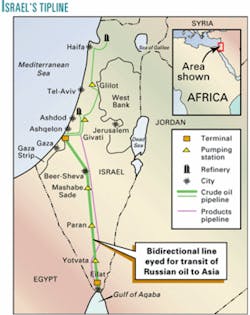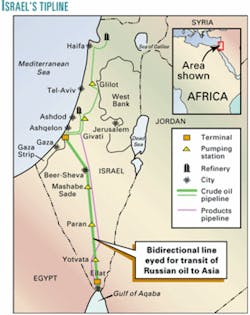Russian-Israeli deal could boost oil exports to Asia
Russia could see substantial increases in its exports of crude oil to south and east Asia following a strategic deal cut with Israel that will see as much as 1.1 million b/d of oil transiting the recently upgraded Trans-Israel Pipeline (Tipline).
"One of the reasons that triggered this project was the assumption that part of the crude oil produced in Russia, the Central Asian Republics, or in the Caucasus and loaded at the various Black Sea oil ports can be marketed at competitive prices for distribution in southern Asia and the Far East," Tipline officials said.
Under terms of the Russian-Israeli agreement, oil from the Black Sea ports of Tuapse, Odessa, and Novorossiysk will first pass through the Bosporus before landing at Ashkelon on Israel's Mediterranean seaboard.
There the oil will be pumped through the 254 km Tipline to Eilat on the Gulf of Aqaba and reloaded onto very large crude carriers for onward shipment through the Red Sea.
Industry experts say the new route could reduce transit time by more than 50%, substantially reducing costs and increasing potential sales of Russian oil. Pumping the oil from Ashkelon to Eilat will take just 4 days, while VLCCs take about 10 days to steam from the Red Sea to Asia compared with the 30-35 days from the Mediterranean around South Africa's Cape of Good Hope.
Russia's oil exports
Russia currently lacks a significant Asian export route, and its Asian-oriented petroleum exports average about 100,000 b/d. While Moscow hopes to step up exports via two projected pipelines to its Pacific coast, no decision has yet been taken on the exact route and, in any case, construction on either line is years off (OGJ Online, Oct. 20, 2003).
Most of Russia's exports are currently shipped from the Black Sea ports of Tuapse, Odessa, and Novorossiysk. But the Russians have long been hampered from reaching other markets by restrictions on the use VLCCs along the Bosporus as well as through the Suez Canal.
Even though Russia will continue to use small tankers through the Bospor- us, the Tipline option will enable Russian crude to bypass the Suez Canal altogether since Ashkelon and Eilat both can handle supertankers. Smaller tanker loads can accumulate at new storage facilities in Israel and eventually be reloaded as larger cargoes on VLCCs. That means Russian crude can begin to find its way to more-distant markets in commercially viable quantities.
Asian Premium
While the deal promises new markets for Russia and a degree of energy security for Israel, it could have a potentially adverse financial effect on Arab producers, who have held a virtual monopoly over crude supplies to East Asia—which allows them to charge a so-called Asian Premium, sometimes as high as $2-3/bbl extra.
But the Russian-Israeli deal is likely to be well received in the Far East where the Asian Premium has long been considered a major economic impediment. "Crude oil prices for the Asian market remained higher than those of European and US markets by $1-1.50/bbl from about 1992 up to now," said Yoshiki Ogawa, a research specialist at Japan's Institute of Energy Economics, last November.
"This problem has a far-reaching effect not only on oil but also on all areas where energy prices are linked to crude oil prices," Ogawa told an Asian energy conference. He underlined the potentially destructive consequences by saying that, "the financial burden of extra costs due to relatively higher crude oil prices is expected to eventually suppress economic and industrial activities in Asia."
Tipline history
Built in 1968, Tipline was part of an Iranian-Israeli effort to bypass the Suez Canal. Supplies of Iranian oil originally landed at Eilat and then were transported northward to Ashkelon. That policy ended in 1979 with the overthrow of the Shah and the rise to power of Iran's mullahs.
Since political accords reached between Israel and Egypt in the 1980s, Tipline has been used to pump small quantities of Egyptian crude oil from Eilat to Ashkelon. But these Egyptian exports have largely dried up since the outbreak of the second Palestinian Intifada in 2000.
Tipline officials announced the completion of changes to the line in July. Apart from reversing making the line bidirectional, authorities also doubled its storage capacity, and developed shipping facilities at the two ports of Eilat and Ashkelon.
One tanker is reportedly scheduled to discharge some 2 million bbl of Russian Urals and Kazakh Tengiz crude at Ashkelon by late November.

